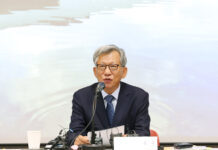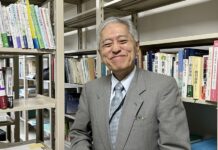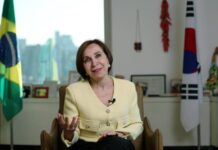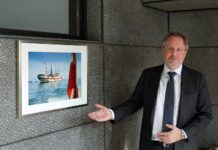| This year, Korea marks the 60th anniversary of diplomatic relations with 15 Latin American countries — Mexico, Argentina, Colombia, Chile, Ecuador, Guatemala, the Dominican Republic, Panama, Costa Rica, Paraguay, El Salvador, Honduras, Jamaica, Nicaragua and Haiti. In 1962, Korea began its path toward modernization through ties with just 27 countries, but in the same year, it forged formal relations with 15 of the 20 Latin American nations achieving independence at the time. Korea.net explores the direction of cooperation between Korea and its Latin American partners through interviews with ambassadors from the region. |
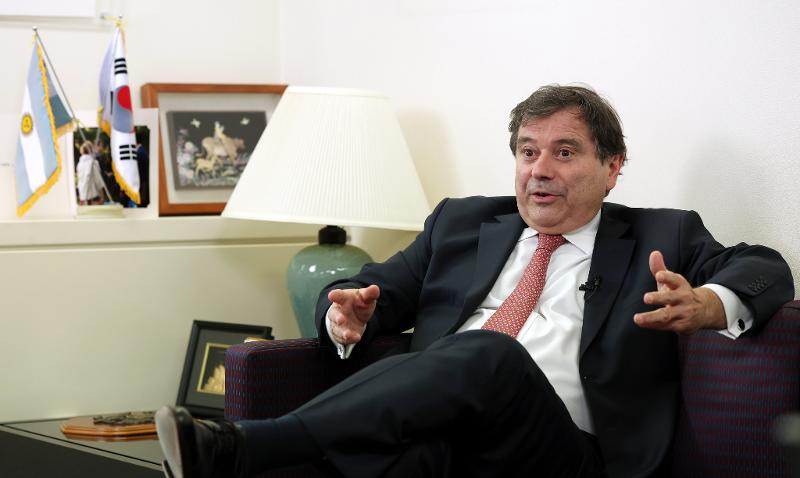
Argentine Ambassador to Korea Alfredo Carlos Bascou on May 17 holds an interview with Korea.net at his embassy in Seoul’s Yongsan-gu District.
By Yoon Sojung and Anais Faure with contribution from Jeong Mi Kyung
Photos = Jeon Han
Video = Kim Sunjoo and Lee Jun Young
Seoul | May 17, 2022
Argentine Ambassador to Korea Alfredo Carlos Bascou says Korea has a strong presence in many sectors in Latin America, adding that that the two countries can expand cooperation in a range of sectors including hydrogen, lithium, energy, artificial intelligence, infrastructure, aerospace and satellites.
In an interview with Korea.net on May 17 at the Argentine Embassy in Seoul’s Yongsan-gu District, the diplomat said, “Trading main export items like kimchi and meat is important but both countries can widen cooperation to any other sector.”
He called the establishment of a comprehensive cooperation partnership in 2004 the most important achievement in 60 years of ties between Seoul and Buenos Aires. Korean immigration to Argentina that occurred right after diplomatic relations were formed in 1962 served as the foundation for developing bilateral ties, he added.
The ambassador said Argentines are highly interested in Korean culture overall ranging from Korean food, pop, TV dramas and language. He added that the National Congress of Argentina last year designated Nov. 22 “Kimchi Day.”
Assuming his post in Seoul in 2019, Ambassador Bascou from 2011-16 served as deputy chief of mission and was responsible for the Investment Section at his country’s embassy in Beijing, China. From 2016-19, he was director of official missions at the ministry’s Undersecretariat of International Economic Relations.
The following are excerpts from the interview at his office in Seoul.
– This year marks the 60th anniversary of diplomatic relationship between Korea and Argentina. What do you feel was the most important task for boosting ties over the last 60 years?
Since the establishment of diplomatic relations on Feb. 15, 1962, the two countries have steadily developed bilateral ties. The Korean Embassy was opened in Buenos Aires in 1963 and the Argentinean Embassy in Seoul in 1966. The two countries formed a comprehensive partnership in 2004, and this is what I believe to be the most meaningful outcome of the 60-year relationship.
After forging bilateral ties, Korean immigration to Argentina began to help further development of relations. In 1989, such immigration reached its peak as more than 40,000 Koreans moved to Argentina. We now have more than 23,000 Korean immigrants in the country.
– How has bilateral cooperation in health and medicine progressed amid the COVID-19 pandemic?
Early in the coronavirus pandemic in July 2020, the leaders of Korea and Argentina had a phone conversation for more than 45 minutes on bilateral cooperation in health and medicine. We appreciate Korea’s donation of 647,000 KF-94 facial masks and protective gear for 3,500 medical personnel. Argentina plans to join the Seoul-based International Vaccine Institute and discuss the development of medicine for COVID-19 treatment.
– What progress has been seen in negotiations on the Korea-MERCOSUR trade agreement?
A free trade agreement must be win-win for all parties involved. Countries will discuss sectors such as agriculture and the phytosanitary industry to reach a mutually beneficial agreement. The negotiations temporarily stopped but will soon resume on the occasion of the launch of Korea’s new government.
MERCOSUR, or the Southern Common Market in Spanish, is a regional integrated market initiated by Argentina, Brazil, Paraguay and Uruguay and subsequently joined by Venezuela and Bolivia. Its territory of almost 15 million square km consists of a variety of natural wealth and resources that the world population needs. Its greatest asset is its people. It has an invaluable heritage of cultural, ethnic, linguistic and religious diversity that coexists harmoniously, making MERCOSUR a region of peace and development as well as a great consumer market.
– What sector does Argentina wish to expand cooperation in with Korea?
Main trading items like kimchi and meat exports are important but I believe Korea and Argentina can strengthen cooperation in many sectors. In Latin America, Korea has a strong presence in a limitless number of industries such as hydrogen, lithium, energy, artificial intelligence, infrastructure, aerospace and satellites. A Korean company recently has invested in lithium development in Argentina for batteries and electric vehicles. We can boost cooperation in these areas.
I also wish to introduce Argentine beef to Korean consumers. Argentine beef is famous in the world along with wine. Exports of Argentine wines have steadily grown in Korea. We are the world’s fifth-largest wine exporter. Given the launch of Korea’s new government, I hope to show Koreans Argentine beef and enjoy Argentine wine with them.
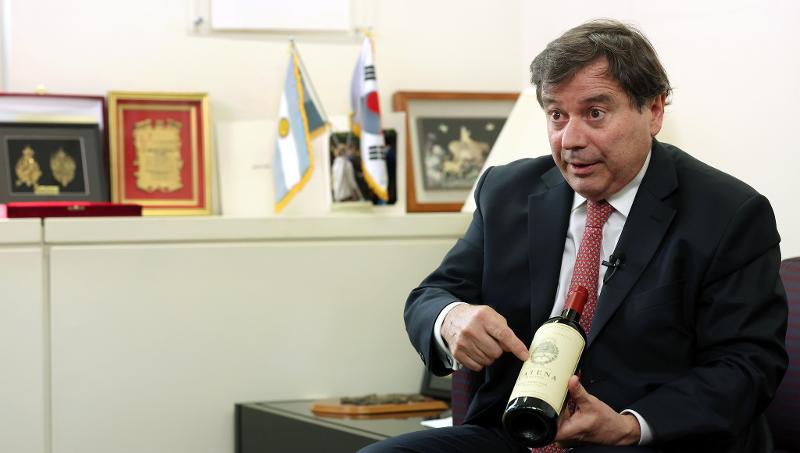
Argentine Ambassador to Korea Alfredo Carlos Bascou introduces an Argentine wine during the May 17 interview with Korea.net. He said Catena, the wine he was holding, can be found only at the Argentine Embassy in Korea, with the logo on the bottle being the Latin American country’s official national emblem.
– What Argentine food or cultural item do you wish to introduce to Koreans?
Korean culture in general has grown increasingly popular in Argentina. It is out of the common and no longer just a trend. Not just Korean food, but K-pop, TV dramas and the language are also popular. In addition, the National Congress of Argentina last year declared Nov. 22 as “Kimchi Day.” Buenos Aires has over 30 Korean restaurants. I also like kimchi, both spicy and not spicy, white kimchi and seafood and green onion pancakes (haemul pajeon).
In December last year, we opened the cultural space Mafalda at our embassy, the one and only place of its kind in Korea. The name “Mafalda” is the title and name of the protagonist of a popular TV cartoon in my country. In June 2019, we opened the movie theater Sala Mirtha Legrand and tango lesson venue Sala Astor Piazzolla inside the embassy to host tango lessons with professional dancers twice a week.
Tango is popular not only in Korea but also across Asia including China and Japan. I think tango is popular because it’s sexy and beautiful. We will resume tango lessons when the COVID-19 situation is more stabilized.
In April and May this year, the embassy hosted lectures on Argentine culture. We will screen Argentine films from June 14-30 so that Koreans can learn about modern Argentine cinema. In July, we will hold tango and live music performances to mark our independence day. In sports, we will host a golf tournament in Seoul where important figures from both countries can take part in.
arete@korea.kr


